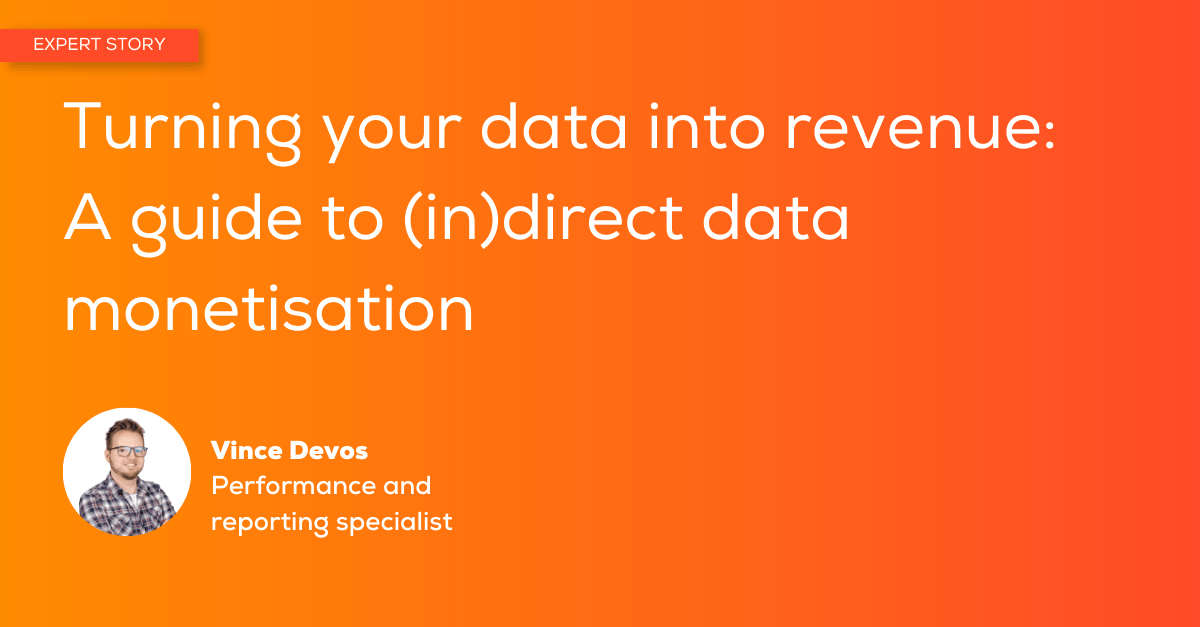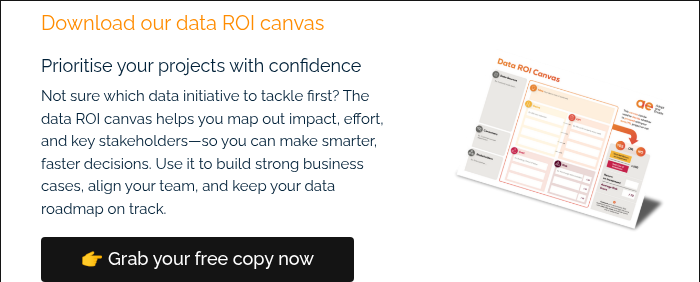
Data is the new gold. With every click, transaction, or sensor ping generating value, it’s no surprise that the European data economy is projected to reach €829 billion by 2025, about 6% of the EU’s total GDP (IMD, 2025). But how do you become part of data economy, what does “data monetisation” really mean?
In this post, we explore what data monetisation is all about, what strategies you can use, challenges you have to consider and some key questions to help guide you.
What data monetisation is (and isn’t)
Data monetisation is all about turning data into financial or strategic value (Talend, 2025).
There are two main approaches:
-
Direct monetisation: Selling data or insights to external stakeholders. For example,Bpost created a service to help marketing teams personalise their print campaigns to specific audiences.
-
Indirect monetisation: Using data internally to improve processes, reduce costs, or enhance the customer experience (Teradata, 2025). For example a retailer forecasting demand to optimize stock levels, or a manufacturer using machine data to trigger predictive maintenance.
This blogpost will mostly cover direct monetisation. You can find more information on indirect monetisation on our Unlock the value of your data website page.
Popular monetisation models
There’s no one-size-fits-all. Many companies combine monetisation models to maximise value. Here are a few of the most common:
|
Model |
Description |
Examples |
| Data-as-a-Service (DaaS) | Selling raw or curated datasets. | SafeGraph, Bloomberg, Acxiom (TrustRadius, 2025) |
| Insight-as-a-Service (IaaS) | Selling analysed, actionable insights | IBM, Deloitte, Accenture (MarketsandMarkets, 2025) |
| Subscription model | Recurring access to data or insights | Statista, LinkedIn |
| Freemium model | Free base-level data, premium features paid. | IPinfo.io, OpenWeatherMap |
Why you should think about direct monetisation
-
New revenue streams: Data becomes a product or service in its own right.
-
Driving innovation: Data fuels new products and services. Continental AG, for example, monetises car data for insurers and smart mobility providers. Your data might help drive innovations and new products, in turn creating more demand for your data.
Important questions to consider
With great data comes great responsibility. Just like with a physical product, there are some key considerations to take into account. The list below helps you to prepare, and make sure you have all your bases covered. So, make sure you have checked them all before moving to monetisation.
Privacy & GDPR
GDPR doesn’t ban monetisation—but it demands transparency, purpose limitation, and user consent. So be sure to check with legal to avoid any unpleasant surprises.
Data quality
Bad data = bad decisions. Just like with indirect monetisation, data governance and cleaning are essential. If your data is incomplete or wrong, your clients could make wrong decisions or lose trust in your products, in turn tarnishing your reputation.
Ethical risks
As a “seller” of data, you are responsible to decide what your data can be used for. Be sure to have strict guidelines to avoid your data being used for discrimination or biased algorithms.
Technology & talent
Without the right tooling and people (data scientists, AI engineers), it will be very difficult to extract the full value from your data.
Data ownership
Who owns the data once it’s combined? GDPR requires full traceability.
Guiding questions to discover hidden opportunities and get started
You might already posses a lot of data, but converting that data into something you can monetise is no easy feat.
-
What data do we own—and what could be its value? It is important to think out of the box here.
-
Who could benefit from our data?
-
How could we market our indirect data?
-
Are we GDPR-compliant? We mentioned it before but it is a very important one to avoid fines or PR-disasters.
-
Do we have the people and the technology in place?
Without the right tooling and people (data scientists, AI engineers), it will be very difficult to extract the full value from your data and effectively market it.
Final thoughts
Data monetisation isn’t just a trend—it’s a strategic lever. When done right, it boosts revenue and drives innovation. The key? Approach it with clarity, compliance, and curiosity.
Want to know more? Listen to our podcast episode or have a chat with one of our experts.







